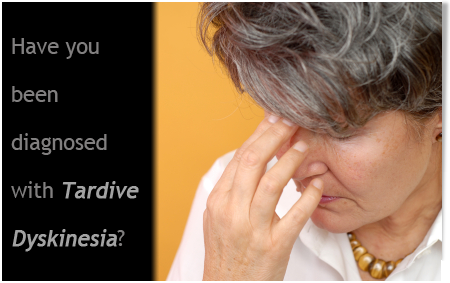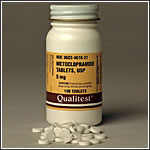
Treatment of tardive dyskinesia is tailored to the individual case, since each person’s needs are different and each responds to treatment in a different way. A wide-range of experimental treatments has been tried for tardive dyskinesia; some are successful, but many remain unproven.
Preventing Tardive Dyskinesia
When a doctor prescribes a neuroleptic, an antiemetic. or some other medication known to cause tardive dyskinesia, he or she should be careful to minimize the potential for the disorder. Medication known to cause tardive dyskinesia should be prescribed in the lowest possible dose for the shortest period of time possible. Elderly patients should generally receive a lower dose of such medication. Medication which can cause tardive dyskinesia should be prescribed only if needed.
known to cause tardive dyskinesia, he or she should be careful to minimize the potential for the disorder. Medication known to cause tardive dyskinesia should be prescribed in the lowest possible dose for the shortest period of time possible. Elderly patients should generally receive a lower dose of such medication. Medication which can cause tardive dyskinesia should be prescribed only if needed.
Elderly people (65+) do not process medicines as well as younger people do. Frail, thin older people are especially at risk. Females are more prone to tardive dyskinesia than males. Dosage for any medication should take into account the patient’s body weight; thin people may need less medication. Older people are more quickly affected by medicine than younger people are; tardive dyskinesia may not appear for three months after a younger person begins taking a medication which can cause the disorder, but symptoms of tardive dyskinesia may appear within a month after an older person begins taking the same drug.
Stopping Tardive Dyskinesia
Discontinuing the medication which is causing the symptoms may lead to a reversal of tardive dyskinesia, but this is frequently not the case. Tardive dykinesia is often permanent. The symptoms may become less pronounced once the person has been off of the medication for a time. Sometimes, a person who has not been experiencing tardive dyskinesia while taking a medication known to cause it will have tardive dyskinesia symptoms after discontinuing the drug.
Medications for Tardive Dyskinesia
When a person is taking a neuroleptic or other medication for a psychiatric disorder such as schizophrenia, completely discontinuing a medication may not be possible. The benefits of reducing the symptoms of schizophrenia or another severe mental disorder may outweigh the risks of tardive dyskinesia.
Sometimes substituting an atypical neuroleptic for a traditional one may help control the person’s psychotic symptoms while reducing the risk of tardive dyskinesia. Clozapine is an atypical neuroleptic that has been used very effectively as a substitute for traditional neuroleptics; like the traditional neuroleptics, Clozapine can cause tardive dyskinesia, but the risk is much less than that from traditional neuroleptics. Patients taking Clozapine must be regularly monitored for agranulocytosis, a condition which can be fatal.
Tardive dyskinesia is difficult to treat. Many different treatments have been tried to eliminate its symptoms, including vitamin E, benzodiazepines, levodopa, reserpine, botullinum toxin, tetrabenazine, dopamine-depleting agents, and calcium channel blockers.
Several studies on the use of vitamin E for tardive dyskinesia have found no hard evidence that vitamin E actually improves the disorder; some patients did show improvement after treatment with vitamin E, but not enough evidence exists to confirm that the improves would due to the vitamin.
Benzodiazepines have been used specifically to treat tardive dyskinesia caused by neuroleptics. There is some evidence that benzodiazepines may help tardive dyskinesia which is caused by a neuroleptic, but there is as yet no definitive proof.
Levodopa is used effectively for Parkinson’s disease and researchers had hoped that it may benefit patients with tardive dyskinesia. Unfortunately, studies of levodopa for tardive dyskinesia have not found this treatment to be very effective.
Reserpine is used to treat hypertension, but it also appears to reduce the symptoms of tardive dyskinesia fairly effectively. It appears to be most effect when the patient is no longer taking a neuroleptic. Unfortunately, Reserpine has several serious side effects including depression, hypotension, and Parkinsonism (a condition which mimics the symptoms of Parkinson’s disease).
Tetrabenazine (not for sale in the United States), a monoamine-depleting agent and dopamine receptor blocker, has also been shown to reduce tardive dyskinesia. Unfortunately, this medication has serious side effects including Parkinsonism, akathisia, and depression; it also causes drowsiness.
Several dopamine-depleting agents have been studied in the treatment of tardive dyskinesia. The most promising one of these drugs is propranolol (Inderal). This drug is used for treating high blood pressure and heart disease. In one study, propranolol began reducing tardive dyskinesia manifestations after the subjects had taken it for 50 days or more.
Calcium channel blockers have also been tried on tardive dyskinesia which was caused by antipsychotic drugs. Reviews of several studies have found no evidence that calcium channel blockers reduce tardive dyskinesia, but there is also not definitive proof that they do not help.
Other Treatments for Tardive Dyskinesia
Some studies have suggested that lithium carbonate, which is frequently used in the treatment of bipolar disorder, may benefit patients with tardive dyskinesia; like so many other possible treatments for tardive dyskinesia there is not yet sufficient evidence to properly evaluate lithium’s effectiveness in controlling the condition.
Amino acids have also shown promise in treating some cases of tardive dyskinesia, but again this treatment is still in the experimental stages. Vitamin B6 has also shown promise, but controlled studies have not been performed.
In one study, insulin seemed to reduce tardive dyskinesia in some patients, but this trial studied a limited number of patients; more studies on insulin’s benefits for tardive dyskinesia are needed before any conclusions can be drawn.
In short, while several medical approaches have been attempted to cure or control tardive dyskinesia, medical science has yet to find a definite answer for this troubling disorder. Caution when prescribing any of the medications associated with tardive dyskinesia is best solution that doctors have yet arrived at. Recently the FDA has noted that drugs contain metoclopramide are probably the most commonly given medications which can cause tardive dyskinesia. Metoclopramide (brand names: Maxolon and Reglan) is given for gastric paresis, acid reflux and other stomach disorders; it is also used to treat headaches caused by a disorder of the cranial blood vessels. If you are concerned that a medication you or a loved is taking may cause tardive dyskinesia, talk with your doctor and your pharmacist about your concerns.
More questions about Tardive Dyskinesia? Fill out the Form Above
